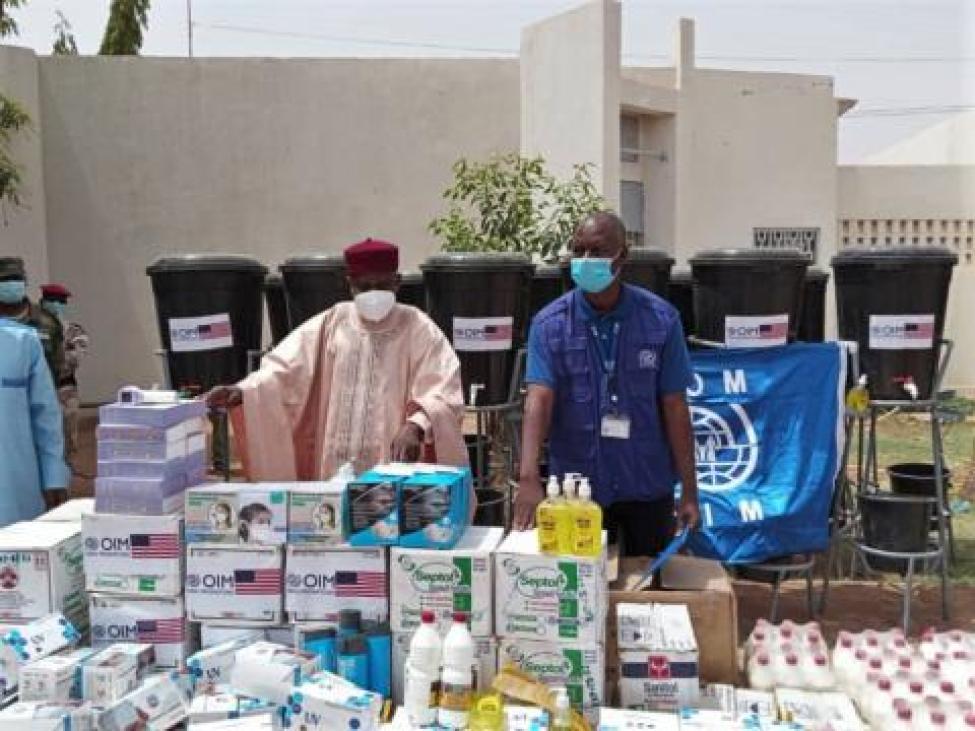-
Qui sommes nous
Qui sommes nousL'Organisation internationale pour les migrations (OIM) fait partie du système des Nations Unies et est la première organisation intergouvernementale à promouvoir depuis 1951 une migration humaine et ordonnée qui profite à tous, composée de 175 Etats membres et présente dans plus de 100 pays.
À propos
À propos
OIM Global
OIM Global
-
Notre travail
Notre travailEn tant que principale organisation intergouvernementale qui promeut depuis 1951 une migration humaine et ordonnée, l'OIM joue un rôle clé pour soutenir la réalisation du Programme 2030 à travers différents domaines d'intervention qui relient à la fois l'aide humanitaire et le développement durable.
Ce que nous faisons
Ce que nous faisons
Priorités transversales (globales)
Priorités transversales (globales)
- Données et ressources
- Agir
- 2030 Agenda
L'OIM fait don de fournitures médicales pour assister des milliers des enfants migrants non accompagnés dans le sud du Niger au milieu de la pandémie
Last Thursday (28/05), the International Organization for Migration (IOM) in Niger, with support from the U.S. Department of State Office to Monitor and Combat Trafficking in Persons (J/TIP), made a donation of medical supplies to four health centers in the region of Zinder in southern Niger, to respond to the continuous arrivals of unaccompanied Nigerien children returning from neighboring Nigeria amid the COVID-19 pandemic. Among the items donated were handwashing stations, surgical masks, thermometers, detergent and liquid soap.
At only 12 years old, Zabeirou is one of the more than 9,000 people who returned to Niger from Nigeria since the beginning of the crisis. “I am waiting with my friends to go home now,” Zabeirou reports from the border. “Our school in Nigeria is closed, so we have no choice but to go home. We all packed our bags and left.”
IOM staff in the city of Zinder, at the border with Nigeria, reported late March that close to 1,000 Nigeriens had arrived from Nigeria by road, through the Dan Barto border post. Another 7,000 have returned to Niger since, most of them unaccompanied talibé children - generally West African boys sent by their parents abroad to study the Quran.
These movements came as consequence of the ban on group prayers and subsequent closure of Koranic schools in the Katsina State, in northern Nigeria, amid the current pandemic.
“I am deeply grateful to our partners for this donation today which will allow us to handle this situation and reduce the numbers of people infected with this heinous virus,” said Mr. Issa Moussa, Governor of the region of Zinder.
Following the ceremony, the items were transported to the four health centers in the cities of Kantché, Moudjia, Droum and Takeita in the region of Zinder, which were the main communities of origin of the returning children.
A similar kit of medical supplies was handed over the same week to Niger’s first center for victims of trafficking opened in July 2019 in Zinder by the National Agency for the Fight Against Trafficking in Persons (ANLTP) in Niger with IOM’s support.
“We are concerned by the significant flows of young migrants returning to Niger as a result of the current COVID-19 pandemic,” said Barbara Rijks, IOM’s Chief of Mission in Niger. “We have worked on a coordinated approach with the authorities and our partners to ensure that these children are getting the best possible support to reintegrate in their communities, while also ensuring that all the health measures are respected.”
The donation took place at the governorate of Zinder in the presence of regional authorities and health experts, including Mr. Issa Moussa, the Governor of the region of Zinder, the regional public health authorities and members of the regional COVID-19 Steering Committee.
The Government of Niger, together with IOM’s country offices in Nigeria and Niger, the Child Protection Working Group in Niger, and multiple NGOs and UN agencies on the ground, have mobilized resources to urgently assist this group of vulnerable Nigerien returnees and are reinforcing the assistance as more returns are expected in the coming weeks.
For more information, please contact Monica Chiriac at IOM Niger at Tel: +227 8931 8764, Email: mchiriac@iom.int.
